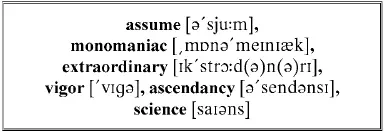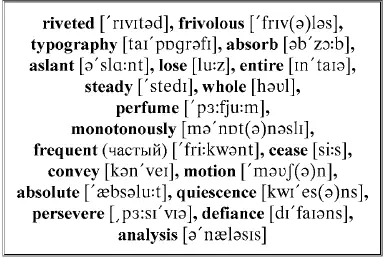Эдгар По - Английский с Эдгаром По. Падение дома Ашеров / Edgar Allan Poe. The Fall of the House of Usher
- Название:Английский с Эдгаром По. Падение дома Ашеров / Edgar Allan Poe. The Fall of the House of Usher
- Автор:
- Жанр:
- Издательство:Литагент «Восточная книга»1243df63-7956-11e4-82c4-002590591ed2
- Год:2012
- Город:Москва
- ISBN:978-5-905971-35-8
- Рейтинг:
- Избранное:Добавить в избранное
-
Отзывы:
-
Ваша оценка:
Эдгар По - Английский с Эдгаром По. Падение дома Ашеров / Edgar Allan Poe. The Fall of the House of Usher краткое содержание
В предлагаемый сборник вошли мистические новеллы Эдгара Аллана По (1809–1849), повествующие о самых темных и загадочных сторонах человеческой натуры. Рассказы адаптированы (без упрощения текста оригинала) по методу Ильи Франка. Уникальность метода заключается в том, что запоминание слов и выражений происходит за счет их повторяемости, без заучивания и необходимости использовать словарь.
Пособие способствует эффективному освоению языка, может служить дополнением к учебной программе. Предназначено для широкого круга лиц, изучающих английский язык и интересующихся английской культурой.
Английский с Эдгаром По. Падение дома Ашеров / Edgar Allan Poe. The Fall of the House of Usher - читать онлайн бесплатно ознакомительный отрывок
Интервал:
Закладка:

 In the mean time my own disease – for I have been told that I should call it by no other appellation – my own disease, then, grew rapidly upon me, and assumed finally a monomaniac character of a novel and extraordinary form – hourly and momently gaining vigor – and at length obtaining over me the most incomprehensible ascendancy. This monomania, if I must so term it, consisted in a morbid irritability of those properties of the mind in metaphysical science termed the attentive .
In the mean time my own disease – for I have been told that I should call it by no other appellation – my own disease, then, grew rapidly upon me, and assumed finally a monomaniac character of a novel and extraordinary form – hourly and momently gaining vigor – and at length obtaining over me the most incomprehensible ascendancy. This monomania, if I must so term it, consisted in a morbid irritability of those properties of the mind in metaphysical science termed the attentive .
It is more than probable that I am not understood(более чем вероятно, что меня не понимают: «я не понят») ; but I fear, indeed, that it is in no manner possible to convey to the mind of the merely general reader(но я боюсь, по правде говоря, что никоим образом не возможно дать уму неспециалиста: «просто общего читателя») , an adequate idea of that nervous intensity of interest (адекватное представление о той нервной интенсивности интереса) with which, in my case, the powers of meditation (not to speak technically)(с которой, в моем случае, силы мышления, говоря общим языком: «чтобы не говорить технически») busied and buried themselves, in the contemplation of even the most ordinary objects of the universe(занимали себя и погружались в созерцание даже самых обычных предметов вселенной).

 It is more than probable that I am not understood; but I fear, indeed, that it is in no manner possible to convey to the mind of the merely general reader, an adequate idea of that nervous intensity of interest with which, in my case, the powers of meditation (not to speak technically) busied and buried themselves, in the contemplation of even the most ordinary objects of the universe.
It is more than probable that I am not understood; but I fear, indeed, that it is in no manner possible to convey to the mind of the merely general reader, an adequate idea of that nervous intensity of interest with which, in my case, the powers of meditation (not to speak technically) busied and buried themselves, in the contemplation of even the most ordinary objects of the universe.
To muse for long unwearied hours, with my attention riveted to some frivolous device on the margin, or in the typography of a book(раздумывать долгими, неутомимыми часами, с вниманием, прикованным к какой-нибудь незначительной детали на полях или в наборе книги) ; to become absorbed, for the better part of a summer’s day, in a quaint shadow falling aslant upon the tapestry or upon the floor(неотрывно смотреть в течение большей: «лучшей» части летнего дня на причудливую тень, падающую косо на гобелен или на пол; to become absorbed – становиться поглощенным ) ; to lose myself, for an entire night, in watching the steady flame of a lamp, or the embers of a fire(терять себя в наблюдении = забывать себя на целую ночь, наблюдая ровное пламя лампы или угли в очаге) ; to dream away whole days over the perfume of a flower(проводить целые дни в мечтании: «мечтать дни прочь» об аромате цветка) ; to repeat, monotonously, some common word(монотонно повторять какое-нибудь обычное слово) , until the sound, by dint of frequent repetition, ceased to convey any idea whatever to the mind(пока звук, силой частого повторения, не прекращал сообщать какую бы то ни было мысль разуму; dint – сила; удар; след от удара, вмятина ) ; to lose all sense of motion or physical existence(терять всякое чувство движения или физического существования) , by means of absolute bodily quiescence(посредством полной телесной неподвижности) long and obstinately persevered in(/в которой/ долго и упорно пребываешь; to persevere – упорствовать, выдерживать ) : such were a few of the most common and least pernicious vagaries induced by a condition of the mental faculties(таковы были некоторые из самых обыкновенных и наименее пагубных причуд, вызванных состоянием умственных способностей; vagary – каприз, причуда; выходка ) , not, indeed, altogether unparalleled(не вовсе, правда, беспримерные: «не имеющие параллелей»; indeed – действительно ) , but certainly bidding defiance to anything like analysis or explanation(но точно бросающие вызов чему-либо вроде анализа или объяснения).

 To muse for long unwearied hours, with my attention riveted to some frivolous device on the margin, or in the typography of a book; to become absorbed, for the better part of a summer’s day, in a quaint shadow falling aslant upon the tapestry or upon the floor; to lose myself, for an entire night, in watching the steady flame of a lamp, or the embers of a fire; to dream away whole days over the perfume of a flower; to repeat, monotonously, some common word, until the sound, by dint of frequent repetition, ceased to convey any idea whatever to the mind; to lose all sense of motion or physical existence, by means of absolute bodily quiescence long and obstinately persevered in: such were a few of the most common and least pernicious vagaries induced by a condition of the mental faculties, not, indeed, altogether unparalleled, but certainly bidding defiance to anything like analysis or explanation.
To muse for long unwearied hours, with my attention riveted to some frivolous device on the margin, or in the typography of a book; to become absorbed, for the better part of a summer’s day, in a quaint shadow falling aslant upon the tapestry or upon the floor; to lose myself, for an entire night, in watching the steady flame of a lamp, or the embers of a fire; to dream away whole days over the perfume of a flower; to repeat, monotonously, some common word, until the sound, by dint of frequent repetition, ceased to convey any idea whatever to the mind; to lose all sense of motion or physical existence, by means of absolute bodily quiescence long and obstinately persevered in: such were a few of the most common and least pernicious vagaries induced by a condition of the mental faculties, not, indeed, altogether unparalleled, but certainly bidding defiance to anything like analysis or explanation.
Yet let me not be misapprehended(и все же не дайте мне быть неправильно понятым = не хочу…; to let – давать, позволять; to misapprehend – неправильно понимать ) . The undue, earnest, and morbid attention thus excited by objects in their own nature frivolous(недолжное, серьезное и болезненное внимание, таким образом возбуждаемое предметами, по своей природе пустячными) , must not be confounded in character with that ruminating propensity common to all mankind(не должно быть спутано по /своим/ свойствам с той склонностью к размышлениям, общей для всего человечества; propensity – склонность; to ruminate – размышлять ) , and more especially indulged in by persons of ardent imagination(и которой особенно предаются люди с пылким воображением; to indulge in smth – предаваться чему-либо ) . It was not even, as might be at first supposed, an extreme condition(это не было даже, как может быть сперва предположено, крайним состоянием) , or exaggeration of such propensity(или преувеличением такой склонности) , but primarily and essentially distinct and different(но изначально и по существу отдельное и отличное /явление/).


 Yet let me not be misapprehended. The undue, earnest, and morbid attention thus excited by objects in their own nature frivolous, must not be confounded in character with that ruminating propensity common to all mankind, and more especially indulged in by persons of ardent imagination. It was not even, as might be at first supposed, an extreme condition, or exaggeration of such propensity, but primarily and essentially distinct and different.
Yet let me not be misapprehended. The undue, earnest, and morbid attention thus excited by objects in their own nature frivolous, must not be confounded in character with that ruminating propensity common to all mankind, and more especially indulged in by persons of ardent imagination. It was not even, as might be at first supposed, an extreme condition, or exaggeration of such propensity, but primarily and essentially distinct and different.
In the one instance(в одном = первом случае) , the dreamer, or enthusiast, being interested by an object usually not frivolous(мечтатель или энтузиаст, будучи заинтересован предметом, обычно не пустячным) , imperceptibly loses sight of this object in a wilderness of deductions and suggestions issuing therefrom(незаметно теряет вид этого предмета = теряет этот предмет из вида в дебрях умозаключений и предположений, исходящих из него) , until, at the conclusion of a day dream often replete with luxury (пока, при завершении мечты, часто исполненной наслаждения ) , he finds the incitamentum , or first cause of his musings, entirely vanished and forgotten(он не находит incitamentum , или первопричину своих размышлений, совершенно исчезнувшей и забытой; to forget – забывать ).


 In the one instance, the dreamer, or enthusiast, being interested by an object usually not frivolous, imperceptibly loses sight of this object in a wilderness of deductions and suggestions issuing therefrom, until, at the conclusion of a day dream often replete with luxury , he finds the incitamentum , or first cause of his musings, entirely vanished and forgotten.
In the one instance, the dreamer, or enthusiast, being interested by an object usually not frivolous, imperceptibly loses sight of this object in a wilderness of deductions and suggestions issuing therefrom, until, at the conclusion of a day dream often replete with luxury , he finds the incitamentum , or first cause of his musings, entirely vanished and forgotten.
In my case, the primary object was invariably frivolous (в моем случае первоначальный объект был неизменно незначителен) , although assuming, through the medium of my distempered vision(хотя и принимавшим, через посредство моего расстроенного видения) , a refracted and unreal importance(искаженную и ненастоящую важность) . Few deductions, if any, were made(мало умозаключений, если /вообще/ какие-либо, были делаемы) ; and those few pertinaciously returning in upon the original object as a centre(да и те немногие /сделанные умозаключения/ – упорно возвращавшиеся к изначальному объекту как к центру /размышлений/).
Читать дальшеИнтервал:
Закладка:










